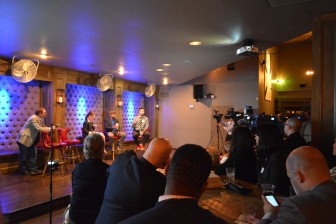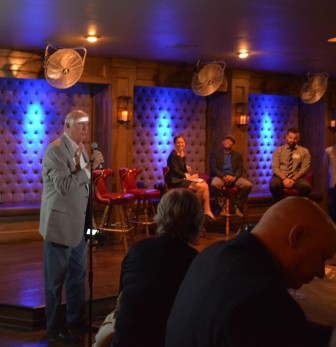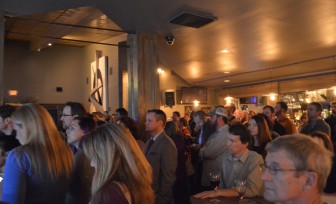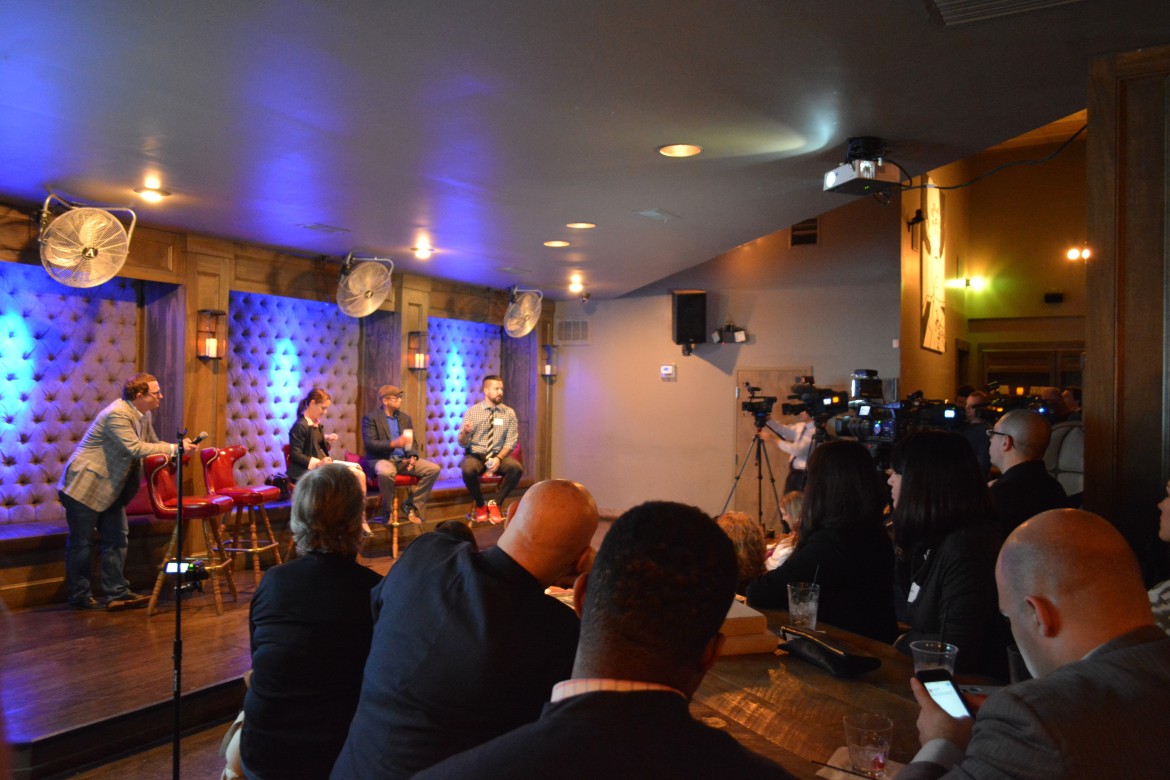It was a packed house at the Architect bar Monday night, where more than 150 people turned out for a public forum on the use of room-rental service Airbnb in Raleigh.

James Borden / Raleigh Public Record
The Architect Bar and Social House was host Monday night to a forum on room-rental service Airbnb
Organized by local public relations consultant Jeff Tippett, the town hall style meeting featured panelists such as tech CEO Justin Miller and speeches from two city councilors. The event was held in response to a complaint filed against Five Points resident Gregg Stebben, who was renting out a room through Airbnb.
City Council took up the issue in its December 2nd meeting, where they voted to inform Stebben that he was in violation and request that he stop renting his room. Enforcement on the violation would not be carried out until late January, following a scheduled January 20 report to City Council on the issue.
Russ Stephenson, one of several city councilors in attendance at Monday’s meeting, told the crowd that the concept of supporting an idea like Airbnb was part of City Council’s mission statement, which begins with the phrase “We are a 21st century city of innovation.”
Stephenson cited a recent trip to San Francisco, where he had a positive experience with Airbnb.
Councilor John Odom addressed the crowd as well, joking that their pleas for sensible government regulation were akin to wishing for the impossible.
The laughs turned to boos, however, when Odom suggested that allowing room rentals in certain parts of the city would create “slum areas.”

James Borden / Raleigh Public Record
City Councilor John Odom addresses a crowd on the issues surrounding room-rental services
More to the point, Odom argued that the matter is a zoning issue. Current zoning laws do not generally allow for commercial use of residential property. Exceptions do exist, such as the allowance of Bed-and-Breakfasts in certain high-density residential districts. However, most of the rooms available on Airbnb for Raleigh are likely in violation of existing zoning codes.
In the December 2 council meeting, Odom noted that the use of residential property as commercial was against the law, and that it allowing it would open the door for abuse in areas where there are already a large portion of rental properties.
A Uniform Crowd

James Borden / Raleigh Public Record
The Architect Bar and Social House was packed Monday night due to a forum on room-rentals in Raleigh
Although attendance at the event ranged the spectrum in terms of age, race and gender, the vast majority were in favor of allowing Raleigh residents to continue using Airbnb. When asked for a show of hands, more than thirty people identified themselves as Airbnb hosts.
Many hosts spoke of their role as akin to that of a small-business owner, and had nothing but good things to say about their experiences. One noted that she offered her guests a safe environment, describing it as “nonsmoking, drug-free and [alcohol free]”
At this, someone called out “No fun there!”
The woman, Patsy, who asked that her last name not be used, said the Airbnb rental was a secondary source of income. “I charge $28 a night,” she said. Patsy’s had guests ranging from college students to a 70-year-old woman. The longest stay was 90 days.
There are more than 400 listings for Raleigh on the Airbnb site, with prices ranging from $20/night for a “Raleigh private near Shelly Lake” to a $300/night “Classic 1935 Home.”
Renters using the site can read a profile and reviews of any potential host, and vice versa.
“I feel safer using a public forum like this than something like Craigslist,” Patsy said.
Seeking a Resolution
As the current model of Airbnb is in violation of existing zoning codes, city council would have to create a new law allowing for its use. Although the city is not actively seeking out violators, they will respond to complaints.
In the December 2 council meeting, City Attorney McCormick noted that the city has historically enforced zoning violations upon complaint. “We don’t have the staff to investigate all possible zoning violations,” he said, and added that he would hate to see a particular kind of violation singled out.
“The publicity this item will get will put people on notice.”
Monday’s crowd was a testament to McCormick’s foresight.
Although the future of room rentals in Raleigh is now in the hands of the city council, Airbnb public policy manager Max Pomeranc cited a recent law in San Jose that the city could look to as a solution. The council there imposed a limit of 180 rental nights per year when the owner is not present. Taxes would also be imposed on the rentals, much in the way taxes are levied on hotel rooms.
Although councilors Odom, Stephenson, Baldwin, Weeks and Gaylord were all present for Monday’s forum, any decision they make on the issue will be stayed at least until the council’s January 20 meeting.
The forum sparked hundreds of tweets using the hashtag Ralairbnb, with many in the audience tweeting the event live. Here are a few samples:If the North Raleigh Party Mansion had listed on Airbnb would it have been legit? #RalAirbnb
— Mark Turner (@mtdotnet) January 5, 2015
If Raleigh bans Airbnb I’ll just start “ITBnb” and it’ll be legal because I have @BonnerGaylord on speed dial. Problem solved. #RalAirbnb
— William N. Finley IV (@WNFIV) January 5, 2015
From a friend: “This is interesting: a liberal crowd fighting gov’t regulation & a Republican city councilman wanting more tax $” #RalAirbnb
— T Greg Doucette (@greg_doucette) January 5, 2015
